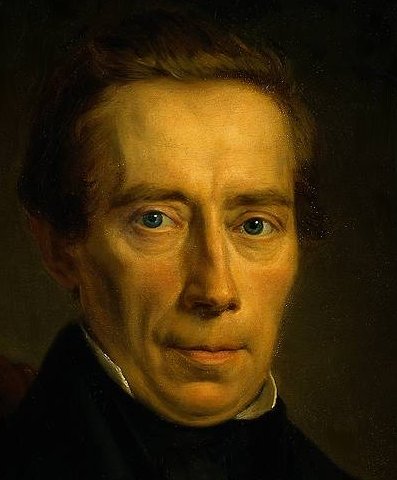- Johan Rudolf Thorbecke
Infobox Prime Minister
name = Johan Rudolph Thorbecke

caption =
order =Prime Minister of the Netherlands
term_start =4 January 1871
term_end =6 July 1872
deputy =
predecessor =Pieter Philip van Bosse
successor =Gerrit de Vries Azn
order2 =Prime Minister of the Netherlands
term_start2 =1 February 1862
term_end2 =10 February 1866
deputy =
predecessor2 =Schelto van Heemstra
successor2 =Isaäc Dignus Fransen van de Putte
order3 =Prime Minister of the Netherlands
term_start3 =1 November 1849
term_end3 =19 April 1853
deputy =
predecessor3 =Jacob de Kempenaer
successor3 =Floris Adriaan van Hall
birth_date = birth date|1798|1|14|mf=y
birth_place =Zwolle ,Netherlands
death_date = death date and age|1872|6|4|1798|1|14|mf=y
death_place = The Hague, Netherlands
spouse = Adelheid Solger
religion =Lutheran [Although he remained aLutheran he was not a churchgoer]
constituency = several
party = Liberal
languagesspoken =Dutch ,German

Audio|Nl-Johan Rudolf Thorbecke.ogg|Johan Rudolf Thorbecke (
January 14 ,1798 –June 4 ,1872 ) was one of the most important Dutch politicians. In 1848, he virtually singlehandedly drafted the revision of the Dutch constitution, giving less power to the king, and more to the parliament.Early life
Thorbecke was born in
Zwolle , and began studying classic literature and philosophy inAmsterdam , studies he finished inLeiden defending a thesis onAsinius Pollio . After studying at several universities inGermany he was appointed at the chair of diplomacy (history of international relations) at theUniversity of Ghent inBelgium , which in those days was part of the Netherlands. Because of the Belgian insurrection in 1830 he had to give up this position, and one year later he was promoted to professor in diplomacy and modern history at theUniversity of Leiden .Political career
In 1839, he published his criticisms of the current Dutch constitution in a very detailed study ('Aanteekening op de grondwet'); as a result, he became a well-known political figure. Five years later, together with eight other politicians, he formulated a proposal to change the Dutch constitution. The proposal, known as the "Voorstel der Negenmannen" ("proposition of the nine men"), did not pass through the
Tweede Kamer , the second chamber of the Dutch parliament.Due to the international unrest in 1848, King William II decided to form a committee for revision of the constitution, and Thorbecke was appointed as the head of that committee. The changes, which were virtually all created by Thorbecke, were grudgingly approved by the parliament. The most important changes were those limiting of the powers of the monarch, introducing direct elections, establishing liberty of religion, and strengthening the powers of the parliament and the ministers. The new constitution was proclaimed on
November 3 , 1848.In 1849, Thorbecke became minister of internal affairs, thereby "de facto" becoming the first
Prime Minister of the Netherlands. During this cabinet, he devised several important laws, most important of which were laws on elections (1850), municipalities (1851) and provinces (1850). His cabinet was forced to resign in 1853 because of the so-called "Aprilbeweging" ("April Movement"), aProtestant group which protested against re-instituting theCatholic diocese s, which Thorbecke's cabinet had allowed.On
January 31 ,1862 , Thorbecke again became minister of internal affairs. During his second cabinet, a new law regarding secondary education was among the most important achievements. Important works regarding national transportation were initiated. The cabinet fell onFebruary 10 ,1866 and Thorbecke resigned, after a conflict regarding criminal law in theDutch East Indies .During the periods he was not part of the government, he was still a very influential member of parliament, quite often pointing out to his colleagues and to the ministers the right way to interpret the constitution.
On
January 4 ,1871 , Thorbecke led his third and final cabinet. His plans for reforms in the army failed, and he became ill in December of that year. He never fully recovered, and he died at his home inThe Hague .Regretted by many, hated by some (he was not a man of concessions), he is nowadays considered a towering figure in the Dutch parliamentary history. There are two statues of Thorbecke (one in Amsterdam and one in Zwolle), and a room in the Dutch parliament building is named after him.
Thorbecke wrote many articles on history and several newspaper articles (especially in the 'Journal de La Haye') on topics of the day. He published a study on the philosophy of history (in German), and all of his speeches in parliament have been published.
References
ee also
*
Liberalism
*Contributions to liberal theory
*Liberalism in the Netherlands External links
* [http://home.planet.nl/~janss281/thorbeckiana.html Some texts written by Thorbecke (in dutch)]
Wikimedia Foundation. 2010.
